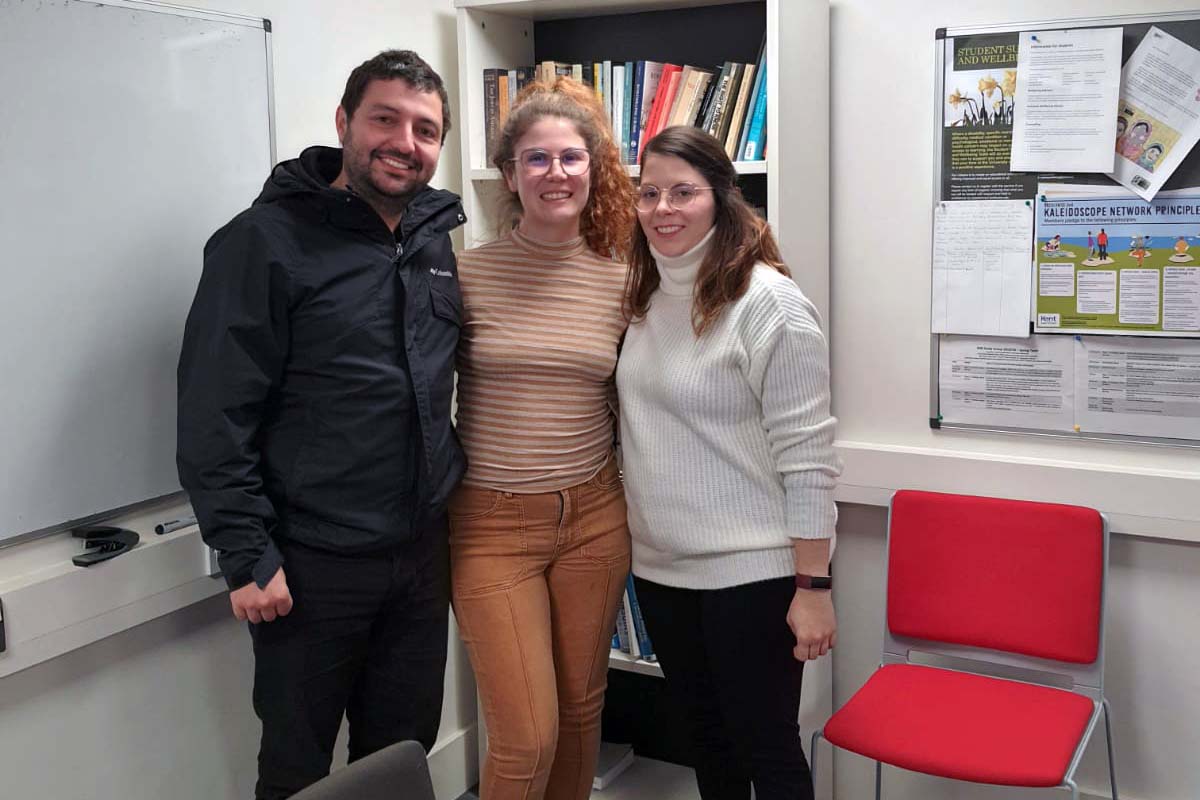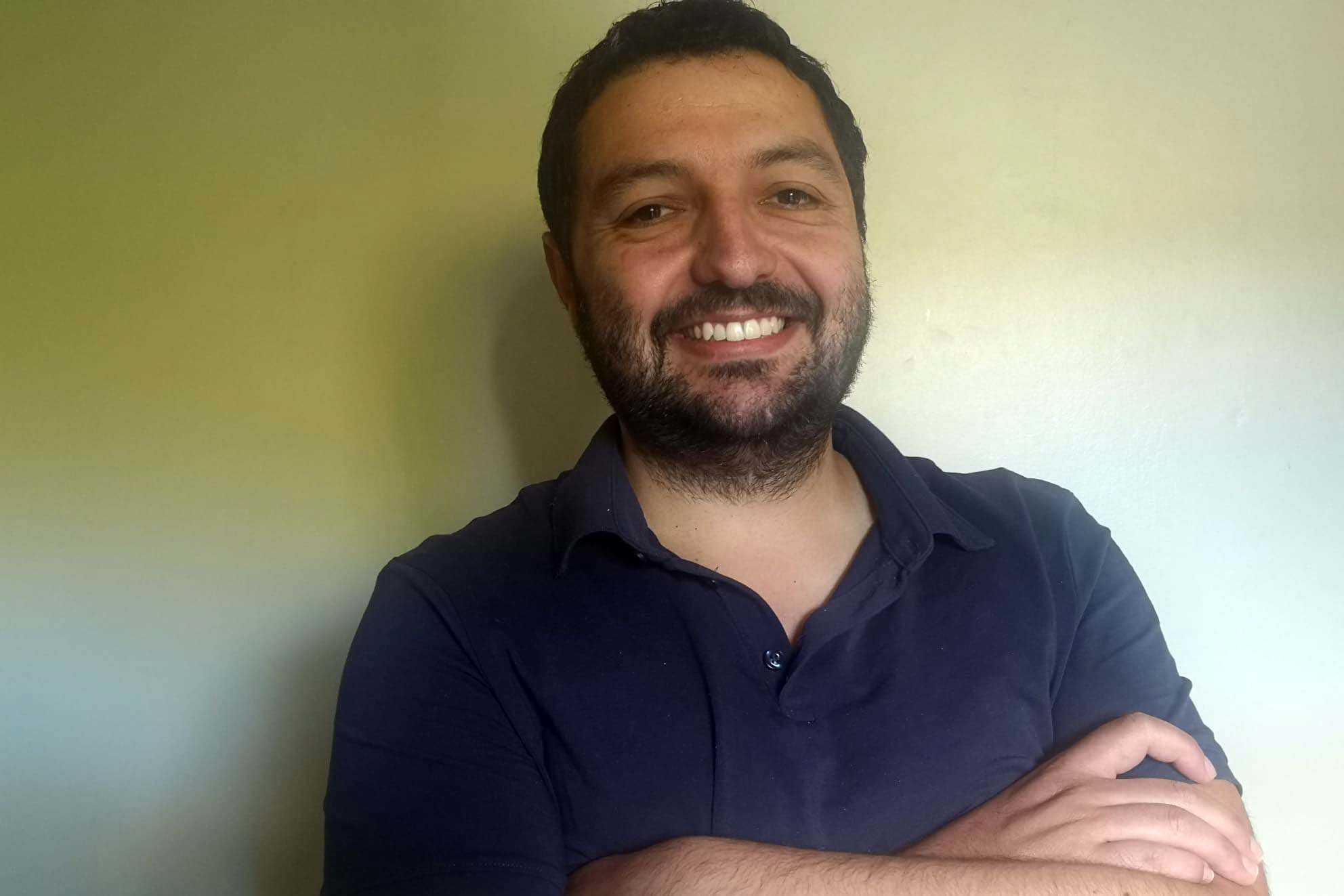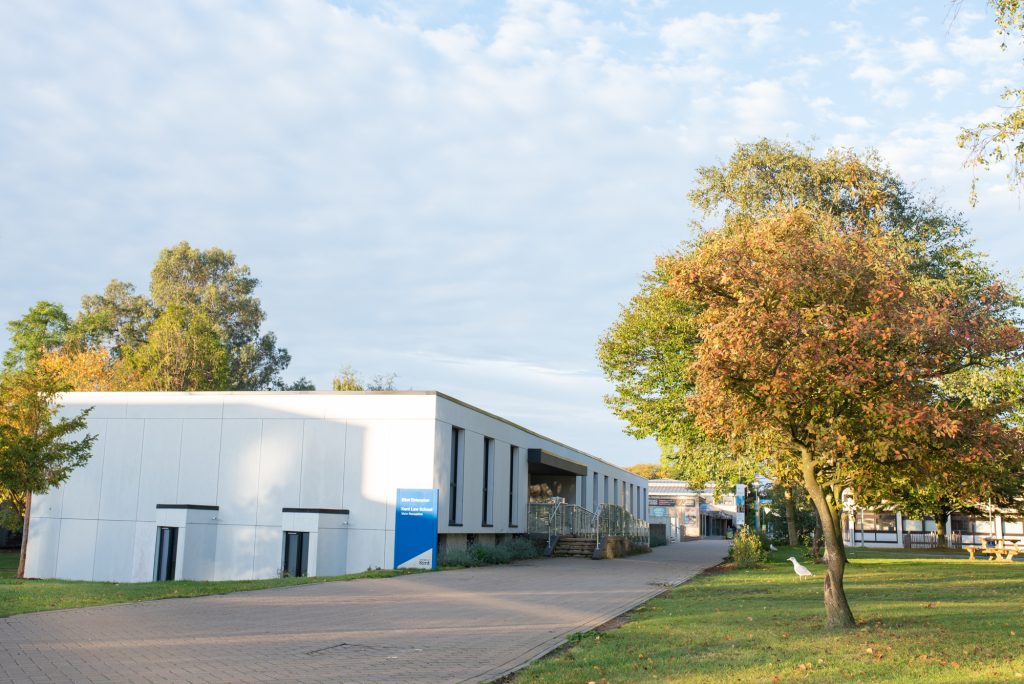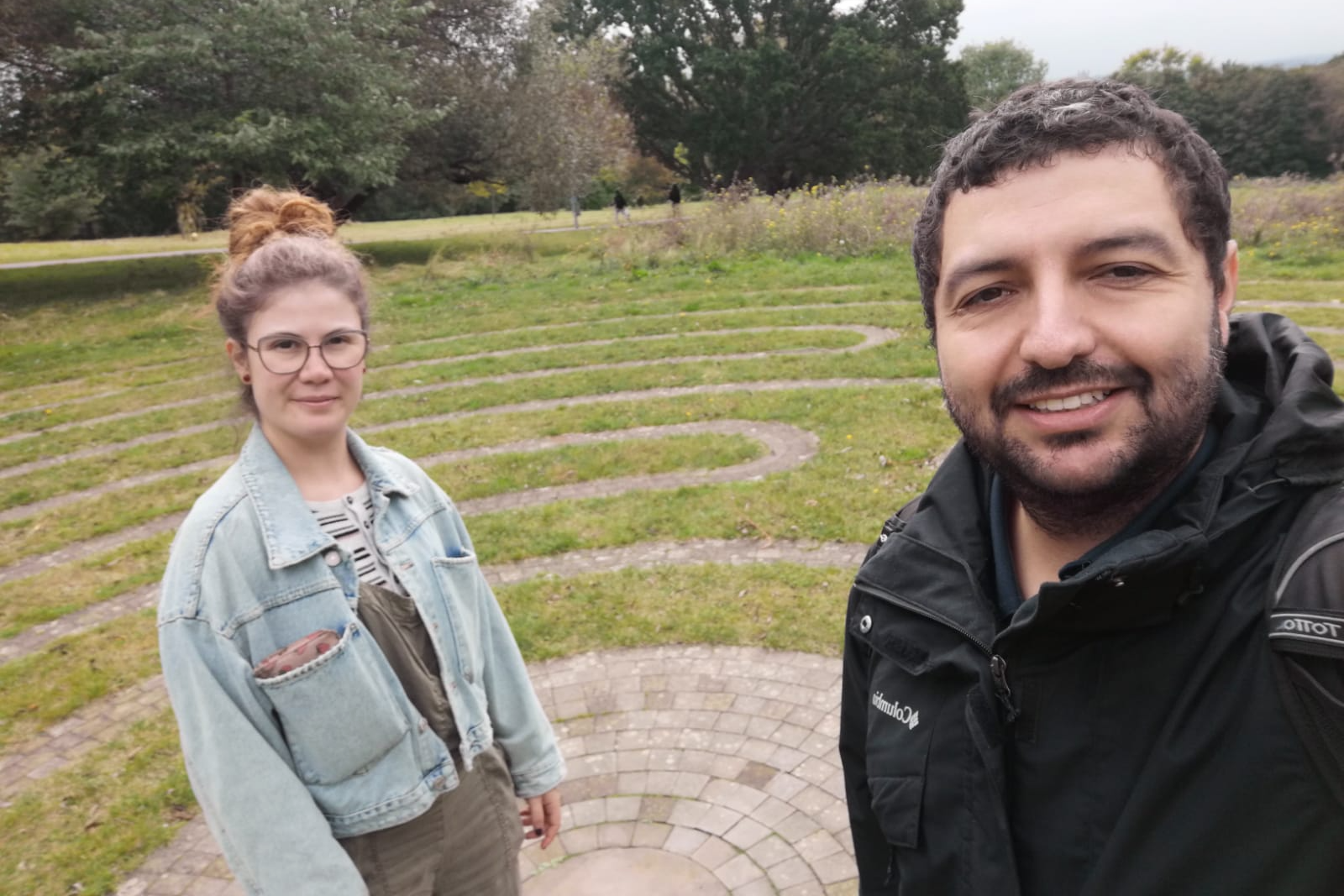Doctoral students from Colombia are reaping the benefits of a burgeoning international relationship between the critical, interdisciplinary legal communities at Kent Law School and the Universidad de los Andes.
Carolina Bejarano, Cristina Hernandez and Joaquín Garzón are three postgraduate research students from Los Andes who have been welcomed to the University as part of a new exchange agreement supported by an Erasmus+ scheme won by Kent.
Carolina Bejarano
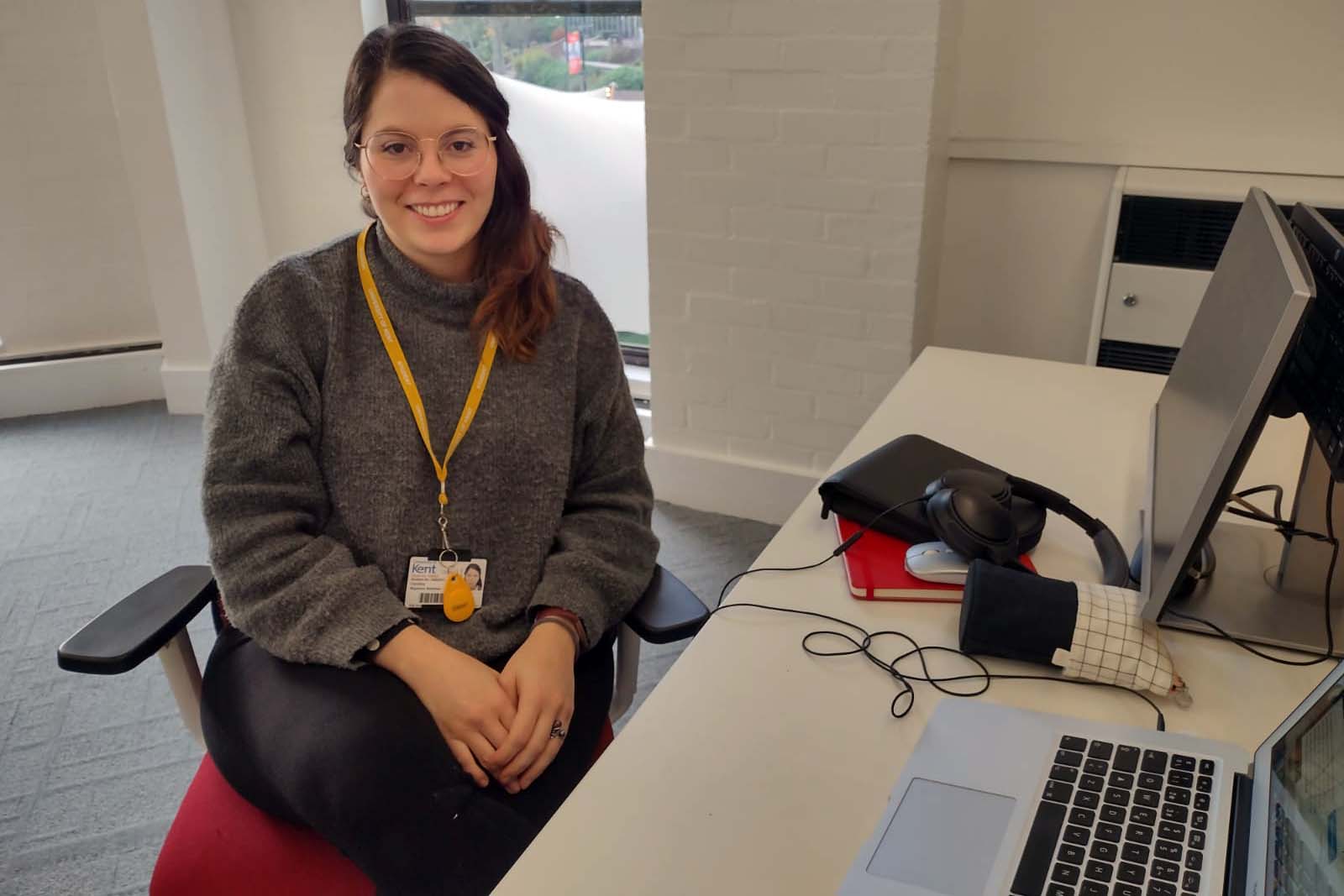 PhD thesis: ‘People of the sea: An ethnography of the afro descendant’s jurisdictional struggle for land in Cartagena, Colombia’
PhD thesis: ‘People of the sea: An ethnography of the afro descendant’s jurisdictional struggle for land in Cartagena, Colombia’
Carolina began her exchange virtually last Autumn. She was largely drawn to study at Kent Law School for the chance to be supervised by Dr Luis Eslava. She said: ‘I knew his work, and I was sure that he would understand my project and help me to advance mine. We share a lot of methodological and conceptual frameworks, and I am learning a lot from him.’
After attending the first year of courses online, she is now studying at Kent’s Canterbury campus through to the completion of her PhD in June 2022. Her thesis, titled ‘People of the sea: An ethnography of the Afro-descendant’s jurisdictional struggle for land in Cartagena, Colombia’, explores the discourses and legal tools of Human Rights Law that the African descendant peoples from the Colombian Caribbean use in their struggles to defend their lands threatened by the expansion of the city and the tourism industry.
Carolina said: ‘The defense of communal spaces in Cartagena takes place in a vast constellation of jurisdictions, which emerges and operates contingently. One of the jurisdictions that I explore deeply in my research is the Human Rights jurisdiction, specifically the discourses and practices linked to the defense of ethnic rights and multiculturalism.’ Carolina is supervised at Los Andes by Dr Miguel Rábago.
Cristina Hernandez
PhD thesis: ‘From Honda to Portsmouth: property, commercial routes, and the shaping of the Magdalena River,1823-1927’
Cristina began her doctoral exchange at Kent in September 2021 where she is supervised by Dr Thanos Zartaloudis. Dr Zartaloudis’ spatial approach to law and his work on the Kent Interdisciplinary Centre for Spatial Studies made her interested in working under his supervision. Her thesis, titled ‘From Honda to Portsmouth: property, commercial routes, and the shaping of the Magdalena River,1823-1927’, explores how the 19th-century cartographic project silenced the cultural complexities (or “amphibian cultures” as Colombian sociologist Orlando Fals Borda calls them) that exist along the Magdalena River in Colombia. Cristina said: ‘Importantly, the impact of this silence does not limit to the Magdalena River or Colombia. Bringing to the surface the “amphibian cultures” silenced during this period give us an alternative understanding over spatial and legal assumptions that keep apart land from water, and about all the material universe that has been built around this distinction in Colombia and beyond.’ Cristina is supervised at Los Andes by Dr María Carolina Olarte-Olarte.
Joaquín Garzón
PhD thesis: ‘Black struggles and the government of the future: Alter-logistics, law and global economy today’
Joaquín also began his exchange at Kent this September. His thesis, titled ‘Black struggles and the government of the future: Alter-logistics, law and the global economy today’, is a legal ethnography focusing on the everyday uses of international law in sociolegal struggles in Colombia. Joaquín said: ‘It is the story of the afro Colombian communities on the Pacific Coast of the country, which are fighting for their rights to land in the context of the expansion of a port and its logistics.’ It’s a topic inspired by Dr Eslava’s interdisciplinary approach which combines international law with anthropology. Joaquín was keen to come to Kent to take up the opportunity to be supervised by Dr Eslava. He said: ‘Kent Law School is a well-known critical legal school where I thought the type of thesis I am writing would resonate and engage in a fruitful debate.’ At Los Andes, Joaquín is supervised by Dr Rábago
The PGR exchange experience at Kent Law School
As part of their exchange experience at Kent, Carolina, Christina and Joaquín have been taking a module on Research Methods in Law, with Professor Amanda Perry-Kessaris, and attending a Postgraduate Research Students’ Study Group with Dr Zartaloudis. The module is designed to enable and inspire students to adopt a practical, critical and imaginative approach to their research process. This training is further developed within the Study Group, which functions as a dedicated compulsory training forum in Theoretical Frameworks to Interdisciplinary Legal Research.
Cristina said: ‘The design methods developed by Professor Perry-Kessaris have enabled a new way of thinking about aesthetic questions in relation to my research, through drawings and other interactions, which has awakened my senses. And the Study Group has enabled us to share our different research and backgrounds. This has allowed me to think about the importance of the researcher.’ Cristina also values the chance to develop a spatial understanding of law with Dr Zartaloudis in the Study Group.
Joaquín is enjoying the opportunity to engage in conversations with academics across the Law School at Kent. He said: ‘This has made me feel welcomed to this intellectual community and has encouraged me to take some exciting paths in my writing. I am also learning how this critical legal community is built and how it serves as an example for this kind of endeavour elsewhere.’
Cristina shares this enthusiasm for being able to meet and work with different academics at the Law School. As well as helping to hone the critical, socio-legal approach she takes to her research, Cristina says the exchange has impacted “every dimension” of her life. She said: ‘I’m really interested now in the findings I can get from the British Library, which has a lot of information on the history of the Magdalena River. Professor Donatella Alessandrini is helping me develop my understanding of commercial routes and the commodity chain supply, and Dr Eslava has showed me ways of approaching different audiences I have to dialogue with during my fieldwork.’
For Carolina, when exploring options for an exchange programme, it was vital for her to be able to come to a law school that shared a socio-legal approach to research. She said: ‘KLS was a perfect option for me because, at the same time it shared my socio-legal approach, I would be learning from research projects and readings from a different academic community.’
Carolina says the experience has already had a very positive impact on her research and on her development as a young scholar: ‘I can now build a bridge between some common concerns of the academic communities I belong to without imposing any of them as the real answer. This is actually what decolonial knowledge building means to me.’
Her time at Kent has also helped Carolina clarify some conceptual and theoretical frameworks: ‘I came here with a long fieldwork experience, and I think my time at Kent has been beneficial for finding fruitful pathways to connect my fieldwork findings with international academic debates and global approaches to law.’
Reasons to undertake a doctoral exchange at Kent Law School…
Carolina, Cristina and Joaquín have no hesitation in recommending the exchange experience to other scholars. Cristina said: ‘What is very interesting about Kent Law School is that the critical approach to socio-legal research is taken into practice in every interaction between teachers and students. This has built very warm and friendly spaces for PhD students.’ Carolina said she had three great reasons to share with scholars considering a doctoral exchange at Kent Law School:
- “Scholars will find a very generous academic community willing to teach them and to learn from them.”
- “There are many different topics and approaches within KLS. Any student willing to look at their subject critically will find someone to work with here at Kent.”
- “The postgraduate research students are very open and generous. It is easy to find lots of great students that will share their own experiences with you.”
A commitment to ongoing research collaborations
Dr Jorge González Jácome, Director of the PhD programme at Los Andes, says the relationship between the two law schools is strengthening common agendas around critical legal scholarship: ‘Engagements between professors and students of the two institutions underscore the commitment in Los Andes and Kent to think about law against the backdrop of social injustices. We would like to see our collaboration as a long-term project that shares the concern of understanding the role of law both preventing and cooperating the processes of social change in different places around the world. Our faculties see each other as natural partners in this agenda.’
Professor Alessandrini, Director of Postgraduate Research at Kent Law School, said: ‘The Erasmus+ programme provides a unique opportunity to enrich our respective research communities through a series of ongoing research collaborations and scholars’ visits. Carolina, Cristina and Joaquin’s fascinating projects attest to the critical, socio-legal and interdisciplinary ethos we share and foster as academic communities; and we feel privileged to be able to contribute to their research journeys.’
What next for Carolina, Cristina and Joaquín?
Carolina is keen to pursue an academic career once her PhD is completed. She has plans to spend some months next summer at the Max Planck Institute for Comparative Public Law and International Law and to continue teaching in Colombia in the future.
Cristina will return to Colombia in June 2022 to continue her research. As yet, she isn’t sure what will come next after she completes her thesis in 2024. She said: ‘I would love to continue developing the knowledge about rivers that my teachers in Colombia, Kent, and the fisher people I work with are encouraging. The place where this could happen is something I still don’t know.’
Joaquín will return to Los Andes in December to continue his doctoral research. He will also continue his work with communities on the Pacific Coast of Colombia.
Postgraduate research degrees at Kent Law School
Kent Law School (KLS) is a dynamic and cosmopolitan place to study a variety of taught (Master’s/LLM) and research degrees (LLM by Research and PhD) with an international and contemporary focus. PhD programmes at KLS include:

